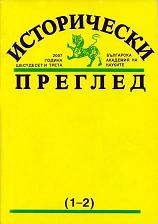Едноличната власт в езическа България
Monolithic Power in Pagan Bulgaria
Author(s): Iliya Georgiev IlievSubject(s): History
Published by: Институт за исторически изследвания - Българска академия на науките
Summary/Abstract: This paper is aimed at examining the principal events in Bulgarian history up to the middle of the 9th c. as presented in the preserved sources on the period and at outlining the most important tendencies in the formation and development of the ruler’s institution in .pagan. Bulgaria. The three elements of state building with the ancient Bulgarians, like other peoples in a similar stage of their historical development, namely territory, people and power, formed and developed in the pre-State period (up to the beginning of the 6th c.). As regards the ruler’s institution, already in the second half of the 4th c. when the Bulgarian tribes went through the flowering of what we call the stage of military democracy, gradually emerged the tendency of the appearance of khan dynasties and of transforming the power of the military leaders into hereditary. This tendency intensified in the next two centuries when part of the Bulgarian tribes occupied the territories of the future “Great Bulgaria”, and the rule of the khans consolidated further as monolithic power. The emergence, inner consolidation and territories expansion of the Bulgarian Khanate of the Lower Danube whereby a major part of the Balkan Slavs were integrated, turned the State into one of the important factors in the policy of the Eastern Mediterranean during the first half of the 9th c. The centralized State rule led to the concentration of all the levers of power - military, administrative, legislative and judicial - into the hands of the Bulgarian Khan.
Journal: Исторически преглед
- Issue Year: 2002
- Issue No: 1-2
- Page Range: 5-23
- Page Count: 19
- Language: Bulgarian
- Content File-PDF

